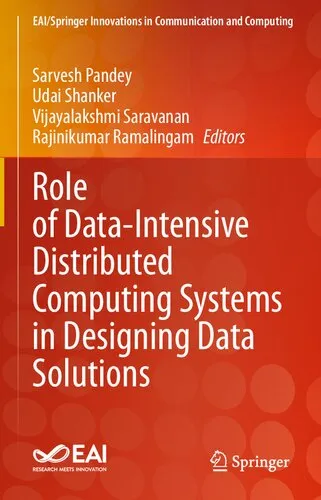Principles of Distributed Systems: 11th International Conference, OPODIS 2007, Guadeloupe, French West Indies, December 17-20, 2007. Proceedings
4.0
بر اساس نظر کاربران

شما میتونید سوالاتتون در باره کتاب رو از هوش مصنوعیش بعد از ورود بپرسید
هر دانلود یا پرسش از هوش مصنوعی 2 امتیاز لازم دارد، برای بدست آوردن امتیاز رایگان، به صفحه ی راهنمای امتیازات سر بزنید و یک سری کار ارزشمند انجام بدینکتاب های مرتبط:
معرفی کتاب
کتاب "Principles of Distributed Systems" مجموعه مقالات و پژوهشهایی است که در یازدهمین کنفرانس بینالمللی OPODIS در سال ۲۰۰۷ در گوآدلوپ، جزایر فرانسه برگزار شده است. این کنفرانس بستری بود برای همکاری محققان، دانشمندان و متخصصان حوزه سیستمهای توزیعشده، به منظور اشتراک ایدهها و یافتههای نوآورانه، که گامی تعیینکننده در درک و پیشرفت این شاخه پیشرفته از علوم کامپیوتر برداشته شد. موضوعات مطرحشده در این کتاب شامل الگوریتمهای توزیعشده، توابع همزمانی، مدیریت منابع توزیعشده و تحلیل پیچیدگی رفتار سیستمها است.
خلاصهای از کتاب
این کتاب مجموعهای از مقالات پژوهشی و تخصصی است که عناوین مختلفی همچون Distributed Algorithms، Fault Tolerance، Synchronization، و Scalability را پوشش میدهد. موضوع اصلی آن بررسی چالشها و فرصتها در طراحی و توسعه سیستمهای توزیعشده با تأکید بر کارایی، اطمینانپذیری و قابلیت توسعه است. مشارکتکنندگان این کنفرانس از دانشمندان برجسته از سراسر جهان تشکیل شدهاند که هر یک مطالب ارزشمندی را در قالب مقالات پژوهشی ارائه کردهاند. این مطالب شامل راهکارهای پیشرفته و تحلیل مسائل مرتبط با ارتباطات در سیستمهای توزیعشده، کاهش پیچیدگی و بهبود عملکرد میباشد.
نکات کلیدی این کتاب
- بررسی الگوریتمهای توزیعی: ارائه الگوریتمهایی برای حل مسائل توزیعشده با تأکید بر Fault Tolerance و Consistency.
- مدیریت منابع: بهینهسازی استفاده از منابع در محیطهای توزیعی و بررسی روشهای تخصیص منابع.
- بررسی چالشهای همزمانی: تحلیل مشکلات Synchronization در سیستمهای مقیاسپذیر و ارائه راهحلهای موثر.
- تحلیل کارایی: ارائه روشهای ارزیابی و بهینهسازی عملکرد سیستمهای توزیعی.
- مطالعات موردی: ارائه مطالعات عملی و کاربردی از سیستمهای توزیعشده واقعی و چالشهای مرتبط.
جملات مشهور از کتاب
"The true challenge in distributed systems is not building individual components, but ensuring that the system as a whole meets the desired goals of scalability, reliability, and efficiency."
"Synchronization problems in distributed environments are the cornerstone of every scalable solution."
چرا این کتاب مهم است
اهمیت این کتاب به دلیل عمق تحلیلها و کیفیت بالای پژوهشهایی است که در آن ارائه شده است. سیستمهای توزیعشده پایهای برای بسیاری از فناوریهای مدرن نظیر Cloud Computing، Internet of Things (IoT) و Big Data هستند. درک دقیق اصول این سیستمها برای متخصصین این حوزه از اهمیت حیاتی برخوردار است. عناوینی که در این کتاب توضیح داده شدهاند، نه تنها برای محققان بلکه برای توسعهدهندگان نرمافزار و مدیران فناوری اطلاعات نیز مفید هستند.
این کتاب یک اثر تعیینکننده در تاریخ علوم کامپیوتر است، زیرا به توسعه درک عمیقتر از مشکلات سیستمهای توزیعی و ارائه روشهایی برای حل این مشکلات میپردازد. همچنین برای کسانی که در حال پژوهش در حوزه سیستمهای پیشرفته محاسباتی هستند، به عنوان منبعی کلیدی و نقطه شروعی ایدهآل محسوب میشود.
Introduction to "Principles of Distributed Systems: 11th International Conference, OPODIS 2007"
This book presents the proceedings of the 11th International Conference on Principles of Distributed Systems (OPODIS 2007), held in Guadeloupe, French West Indies, from December 17-20, 2007. As a leading event in the field, OPODIS has been a platform for promoting groundbreaking research and innovative ideas in distributed systems and distributed computing. The 2007 edition of the conference brought together a diverse and dynamic assembly of researchers, scholars, and practitioners, offering a rigorous collection of studies, discussions, and experimental results aimed at addressing the challenges of distributed systems in an ever-evolving technological landscape.
A Detailed Summary of the Book
The proceedings encapsulate the depth and breadth of the research presented during OPODIS 2007. Focus areas include distributed algorithms, fault tolerance, synchronization, network optimization, and emerging technologies for distributed architectures. The volume is meticulously organized, showcasing contributions that refine existing paradigms and introduce new methodologies for solving complex problems in distributed systems.
Each paper encapsulates rigorous theoretical exploration, practical experimentation, or real-world applications. Theoretical contributions delve into topics like Byzantine fault-tolerant systems, self-stabilizing algorithms, and dynamic networks, while practical innovations address efficiency in distributed computations and scalability issues. Furthermore, particular emphasis is placed on enhancing performance and resilience in distributed environments, which are vital for applications spanning cloud computing, large-scale data processing, and real-time systems.
By capturing a variety of high-quality contributions, the book fosters dialogue across academic and industry boundaries. It serves as an invaluable resource for scholars looking to understand contemporary advancements in distributed systems and for practitioners aiming to implement these developments in real-world scenarios.
Key Takeaways
- A comprehensive exploration of distributed algorithms that ensure system performance, fault tolerance, and synchronization in scenarios with multiple concurrent processes.
- Insightful research into the challenges of complex networks, particularly relating to optimization for scalability, efficiency, and resiliency.
- Real-world applications of distributed systems research, including advancements in cloud computing, peer-to-peer networks, and critical system architecture.
- Theoretical breakthroughs in areas like game theory for system modeling, dynamic graphs, and self-organizing networks for next-generation distributed systems.
Famous Quotes from the Book
“Distributed systems are inherently systems of collaboration — and their success lies in balancing autonomy and coordination for achieving optimal outcomes.”
“Fault tolerance isn’t optional. It is the cornerstone of reliability in any distributed architecture, from small-scale systems to globally distributed platforms.”
Why This Book Matters
The "Principles of Distributed Systems" series is vital for anyone interested in understanding or contributing to distributed computing. The 11th installment continues this tradition by shedding light on significant research breakthroughs and fostering forward-thinking discussion. In today's world, where distributed systems form the backbone of many critical applications, from fintech to healthcare systems and beyond, the insights in this book pave the way for innovation and resilience in tackling real-world challenges.
Additionally, the book maintains its relevance not only to scholars and academics but also to industry professionals who must deal with complex multi-node architectures and securely manage large-scale systems that span geographical boundaries. With its mixture of theoretical depth and practical relevance, it addresses key questions in distributed systems' reliability, scalability, and efficiency.
By offering readers the chance to explore the state-of-the-art developments presented during OPODIS 2007, this book equips them with the knowledge and tools to drive forward research and explore new horizons in the ever-expanding domain of distributed systems.
دانلود رایگان مستقیم
شما میتونید سوالاتتون در باره کتاب رو از هوش مصنوعیش بعد از ورود بپرسید
دسترسی به کتابها از طریق پلتفرمهای قانونی و کتابخانههای عمومی نه تنها از حقوق نویسندگان و ناشران حمایت میکند، بلکه به پایداری فرهنگ کتابخوانی نیز کمک میرساند. پیش از دانلود، لحظهای به بررسی این گزینهها فکر کنید.
این کتاب رو در پلتفرم های دیگه ببینید
WorldCat به شما کمک میکنه تا کتاب ها رو در کتابخانه های سراسر دنیا پیدا کنید
امتیازها، نظرات تخصصی و صحبت ها درباره کتاب را در Goodreads ببینید
کتابهای کمیاب یا دست دوم را در AbeBooks پیدا کنید و بخرید
1167
بازدید4.0
امتیاز50
نظر98%
رضایتنظرات:
4.0
بر اساس 0 نظر کاربران
"کیفیت چاپ عالی بود، خیلی راضیام"
Questions & Answers
Ask questions about this book or help others by answering
No questions yet. Be the first to ask!



